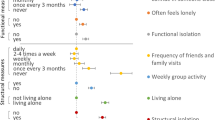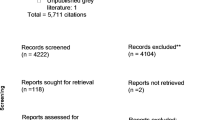Abstract
There is growing evidence that participating in social activities by older adults improves their health, subjective wellbeing, and ultimately prolong their lifespan. However, in Ghana, there is a dearth of studies on the social activities of older adults and the relationship between social activities and subjective wellbeing. This study describes the social activities engaged in by older Ghanaian adults and explores the relationship between social activities and subjective wellbeing. Data for the study was obtained from the World Health Organization’s study on Global Ageing and Adult Health (SAGE) wave 1. This report is based on 3970 adults aged 50 years and above who had complete data on all the variables measured. Binary logistic regression analysis was used to examine the association between social activities and subjective wellbeing. The data shows that majority of older Ghanaian adults do engage in social activities. However, being female, not married, and poor health was negatively associated with participation in social activities. In addition, there was a consistent decline in subjective wellbeing with age across all measured aspects of subjective wellbeing—life satisfaction, subjective wellbeing and happiness. The data shows a strong association between social activities and subjective wellbeing. Furthermore, engaging in family and friends’ and community related activities was positively associated with subjective wellbeing. However, engaging in religious activities was not positively correlated with subjective wellbeing. It is recommended that policies that encourage older Ghanaian adults, especially the poor and women, to engage more in social activities should be enacted.
Similar content being viewed by others
References
Aboderin, I. (2004). Decline in material family support for older people in urban Ghana, Africa: understanding processes and causes of change. Journal of Gerontology: SOCIAL SCIENCES, 59B(3), S128–S137.
Addai, I., Opoku-Agyeman, C., & Amanfu, S. K. (2014). Exploring predictors of subjective well-being in Ghana: A micro-level study. Journal of Happiness Studies, 15(4), 869–890.
Ambrey, C. L., & Fleming, C. M. (2014). Life satisfaction in Australia: evidence from ten years of the HILDA survey. Social Indicators Research, 115(2), 691–714.
Barrett, A., Burke, H., Cronin, H., Hickey, A., Kamiya, Y., Kenny, R. A., et al. (2011). Fifty plus in Ireland 2011: First results from the Irish longitudinal study on ageing (TILDA). Dublin: Trinity College Dublin.
Biritwum, R., Mensah, G., Yawson, A., & Minicuci, N. (2013). Study on global AGEing and adult health (SAGE), wave 1: The Ghana national report. Geneva: World Health Organization.
Blanchflower, D. G., & Oswald, A. J. (2008). Is well-being U-shaped over the life cycle? Social Science & Medicine, 66(8), 1733–1749.
Carver, L., Beamish, R., Phillips, S., & Villeneuve, M. (2018). A scoping review: social participation as a cornerstone of successful aging in place among rural older adults. Geriatrics, 3(4), 75.
Cheng, S.-T., Lee, C. K., Chan, A. C., Leung, E. M., & Lee, J.-J. (2009). Social network types and subjective well-being in Chinese older adults. The Journals of Gerontology Series B: Psychological Sciences and Social Sciences, 64(6), 713–722.
Cooper, H., Okamura, L., & Gurka, V. (1992). Social activity and subjective well-being. Personality and Individual Differences, 13(5), 573–583.
Crampton, A. (2013). No peace in the house: witchcraft accusations as an “old Woman's problem” in Ghana. Anthropology & Aging Quarterly, 34(2): 199–212.
Deaton, A. (2008). Income, health, and well-being around the world: evidence from the Gallup world poll. Journal of Economic Perspectives, 22(2), 53–72.
Diener, E., & Oishi, S. (2000). Money and happiness: Income and subjective well-being across nations. Culture and Subjective Well-Being, 185–218.
Diener, E., & Ryan, K. (2009). Subjective well-being: A general overview. South Africa Journal of Psychology, 39(4), 391–406.
Diener, E., Sandvik, E., Seidlitz, L., & Diener, M. (1993). The relationship between income and subjective well-being: Relative or absolute? Social Indicators Research, 28(3), 195–223.
Diener, E., Lucas, R. E., & Oishi, S. (2002). Subjective well-being. Handbook of Positive Psychology, 16(2), 63–73.
Ghana Statistical Service. (2013). 2010 Population & Housing Census Report: The elderly in Ghana. Ghana Statistical Service.
Ghana Statistical Service. (2014). 2010 Population and Housing Census: Ghana Statistical Service.
Ghana Statistical Service. (2015). Ghana Demographic and Health Survey, 2014 Report: Ghana.
Gilmour, H. (2012). Social participation and the health and well-being of Canadian seniors. Health Reports, 23(4), 1B.
Gómez-Olivé, X. F., Thorogood, M., Clark, B. D., Kahn, K., & Tollman, S. M. (2010). Assessing health and well-being among older people in rural South Africa. Global Health Action, 3(1), 2126.
Gutiérrez, M., Tomás, J., Galiana, L., Sancho, P., & Cebrià, M. (2013). Predicting life satisfaction of the Angolan elderly: A structural model. Aging & Mental Health, 17(1), 94–101.
Health and Well-Being around the World: Evidence from the Gallup World Poll. NBER Working Paper(13317).
Huxhold, O., Miche, M., & Schüz, B. (2013). Benefits of having friends in older ages: Differential effects of informal social activities on well-being in middle-aged and older adults. The Journals of Gerontology Series B: Psychological Sciences and Social Sciences, 69(3), 366–375.
Inglehart, R. (2002). Gender, aging, and subjective well-being. International Journal of Comparative Sociology, 43(3–5), 391–408.
Kodzi, I. A., Gyimah, S. O., Emina, J. B., & Ezeh, A. C. (2011). Understanding ageing in sub-Saharan Africa: exploring the contributions of religious and secular social involvement to life satisfaction. Ageing and Society, 31(3), 455–474.
Kowal, P., Chatterji, S., Naidoo, N., Biritwum, R., Fan, W., Lopez Ridaura, R., et al. (2012). Data resource profile: the World Health Organization study on global AGEing and adult health (SAGE). International Journal of Epidemiology, 41(6), 1639–1649.
Kwabena-Adade, J. O. A. N. A. (2018). Home away from home: The emerging forms of aged Care in the Urban Centres of the Greater Accra region of Ghana. Unpublished Doctoral Dissertation, University of Ghana.
Kyobutungi, C., Egondi, T., & Ezeh, A. (2010). The health and well-being of older people in Nairobi's slums. Global Health Action, 3(1), 2138.
Macia, E., Duboz, P., Montepare, J. M., & Gueye, L. (2015). Exploring life satisfaction among older adults in Dakar. Journal of Cross-Cultural Gerontology, 30(4), 377–391.
Marsh, C., Agius, P. A., Jayakody, G., Shajehan, R., Abeywickrema, C., Durrant, K., Luchters, S., & Holmes, W. (2018). Factors associated with social participation amongst elders in rural Sri Lanka: a cross-sectional mixed methods analysis. BMC Public Health, 18(1), 636.
Mwanyangala, M., Mayombana, C., Urassa, H., Charles, J., Mahutanga, C., Abdullah, S., & Nathan, R. (2010). Health status and quality of life among older adults in rural Tanzania. Global Health Action, 3(1), 2142.
Nukunya, G. K. (2014). Tradition and change in Ghana: An introduction to sociology. Accra: Woeli Publishers.
Okun, M. A., Stock, W. A., Haring, M. J., & Witter, R. A. (1984). The social activity/subjective well-being relation: a quantitative synthesis. Research on Aging, 6(1), 45–65.
Oppong, C. (2006). Familial roles and social transformations: older men and women in sub-Saharan Africa. Research on Aging, 28(6), 654–668.
Pinquart, M., & Sörensen, S. (2000). Influences of socioeconomic status, social network, and competence on subjective well-being in later life: a meta-analysis. American Psychological Association, 15(2), 187–224.
Pokimica, J., Addai, I., & Takyi, B. K. (2012). Religion and subjective well-being in Ghana. Social Indicators Research, 106(1), 61–79.
Schatz, E., Gómez-Olivé, X., Ralston, M., Menken, J., & Tollman, S. (2012). The impact of pensions on health and wellbeing in rural South Africa: does gender matter? Social Science & Medicine, 75(10), 1864–1873.
Seeman, T. E. (2000). Health promoting effects of friends and family on health outcomes in older adults. American Journal of Health Promotion, 14(6), 362–370.
Sirven, N., & Debrand, T. (2008). Social participation and healthy ageing: an international comparison using SHARE data. Social Science & Medicine, 67(12), 2017–2026.
Thomas, P. A. (2009). Is it better to give or to receive? Social support and the well-being of older adults. The Journals of Gerontology Series B: Psychological Sciences and Social Sciences, 65(3), 351–357.
Van Der Geest, S. (2004). “They Don't come to listen”: the experience of loneliness among older people in Kwahu, Ghana. Journal of Cross-Cultural Gerontology, 19(2), 77–96.
Van Minh, H., Byass, P., Thi Kim Chuc, N., & Wall, S. (2010). Patterns of health status and quality of life among older people in rural Viet Nam. Global Health Action, 3(1), 2124.
WHO. (2015). http://www.who.int/countries/gha/en/. Retrieved 27/10/2017S, from http://www.who.int/ageing/events/world-report-2015-launch/en/
Willie-Tyndale, D., Holder-Nevins, D., Mitchell-Fearon, K., James, K., Laws, H., Waldron, N. K., & Eldemire-Shearer, D. (2016). Participation in social activities and the association with socio-demographic and health-related factors among community-dwelling older adults in Jamaica. Journal of Cross-Cultural Gerontology, 31(4), 427–447.
Zhang, Z., & Zhang, J. (2015). Social participation and subjective well-being among retirees in China. Social Indicators Research, 123(1), 143–160.
Author information
Authors and Affiliations
Corresponding author
Additional information
Publisher’s Note
Springer Nature remains neutral with regard to jurisdictional claims in published maps and institutional affiliations.
Appendix
Appendix
Rights and permissions
About this article
Cite this article
Ohemeng, F., Small, B. & Molinari, V. Social Activities and Subjective Well-Being of OlderAdults in Ghana. Population Ageing 13, 443–463 (2020). https://doi.org/10.1007/s12062-019-09251-9
Received:
Accepted:
Published:
Issue Date:
DOI: https://doi.org/10.1007/s12062-019-09251-9




